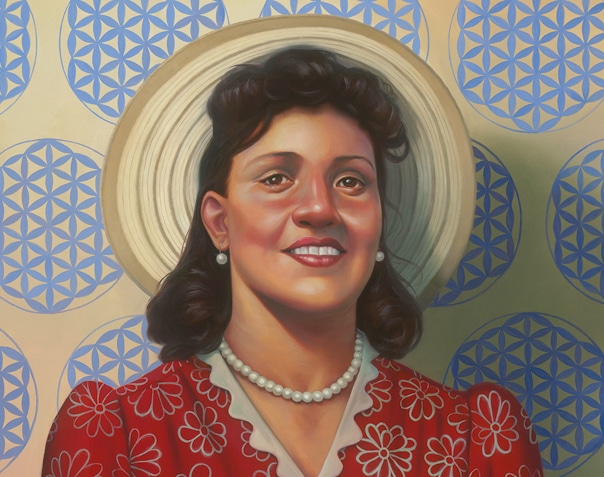
Henrietta Lacks, portrait by Kadir Nelson via the Smithsonian Institute
Henrietta Lacks was born in Roanoke, Virginia in 1920. After her mother died, she went to live with her maternal grandfather in Clover, Virginia, where she grew up farming tobacco. She married in 1941 and, later that year, she and her husband relocated to Baltimore County, Maryland. Together she and her husband had five children.
After the birth of her fifth child in 1951, Henrietta went to the hospital for what she described as a knot in her womb. She was eventually diagnosed with a form of cervical cancer, and was treated with radium tube inserts per the treatment standards at that time. During her treatment, the medical staff took two tissue samples from her cervix without her permission, which was then common practice in the US. One sample was healthy tissue and the other one was cancerous. Unfortunately, Henrietta’s treatment was unsuccessful. She passed away later that year.
The physician who received the cells, Dr. George Otto Gey, discovered that the cancerous cells were more durable than most cells. Typically, cells cultured from other human cells would last only a few days. The “HeLa” cell line (so-called by using the first two letters of Henrietta’s first and last names) established by Dr. Gey was deemed “immortal” in the sense that the cells could keep dividing an unlimited number of times. While the origins of the cells were hidden, the “immortal” cell line they produced became valuable intellectual property. The cells were mass produced and commercialized worldwide.
Henrietta’s cells provided the basis for medical breakthroughs even 70 years after they were first collected. They led to two Nobel Prizes and over 17,000 patents, producing billions in income (for everyone but Henrietta and her family). Jonas Salk developed the polio vaccine from research on her cells. Henrietta died without knowing the significance of her cells. It was over 20 years before her family learned of their importance.
Henrietta’s family have received none of the money generated by the commercialization of her cells. They could not even afford their own medical care or a tombstone for Henrietta. Rebecca Skloot, who wrote the book The Immortal Life of Henrietta Lacks, has created a foundation to support families whose contributions to medical research were made without their knowledge.
Henrietta has been called the “mother of modern medicine.” She never received the acknowledgement she deserved. In fact, she would still be unknown today without investigations into who contributed the HeLa cells. In many ways, this is part of a larger story about how our society has used and abused black bodies to advance medical science. The field of modern gynecology, for example, rests on a history of unethical experimentation on black enslaved women. You’ll find more about this larger story in Medical Apartheid, by Harriet A. Washington.
Just imagine how we might pay tribute to the hidden heroes who lived their lives without recognition of the contributions they made to society. In some cases, it may take time for society to fully appreciate these contributions. In Henrietta’s case, she was denied the recognition she deserved to cover up what are now clearly seen as unethical practices. What if we paid these hidden heroes their due? Just imagine what this might look like.
* * *
“If something comes to life in others because of you, then you have made an approach to immortality.” Norman Cousins (Author)
This is part of our “Just Imagine” series of occasional posts, inviting you to join us in imagining positive possibilities for a citizen-centered democracy.



